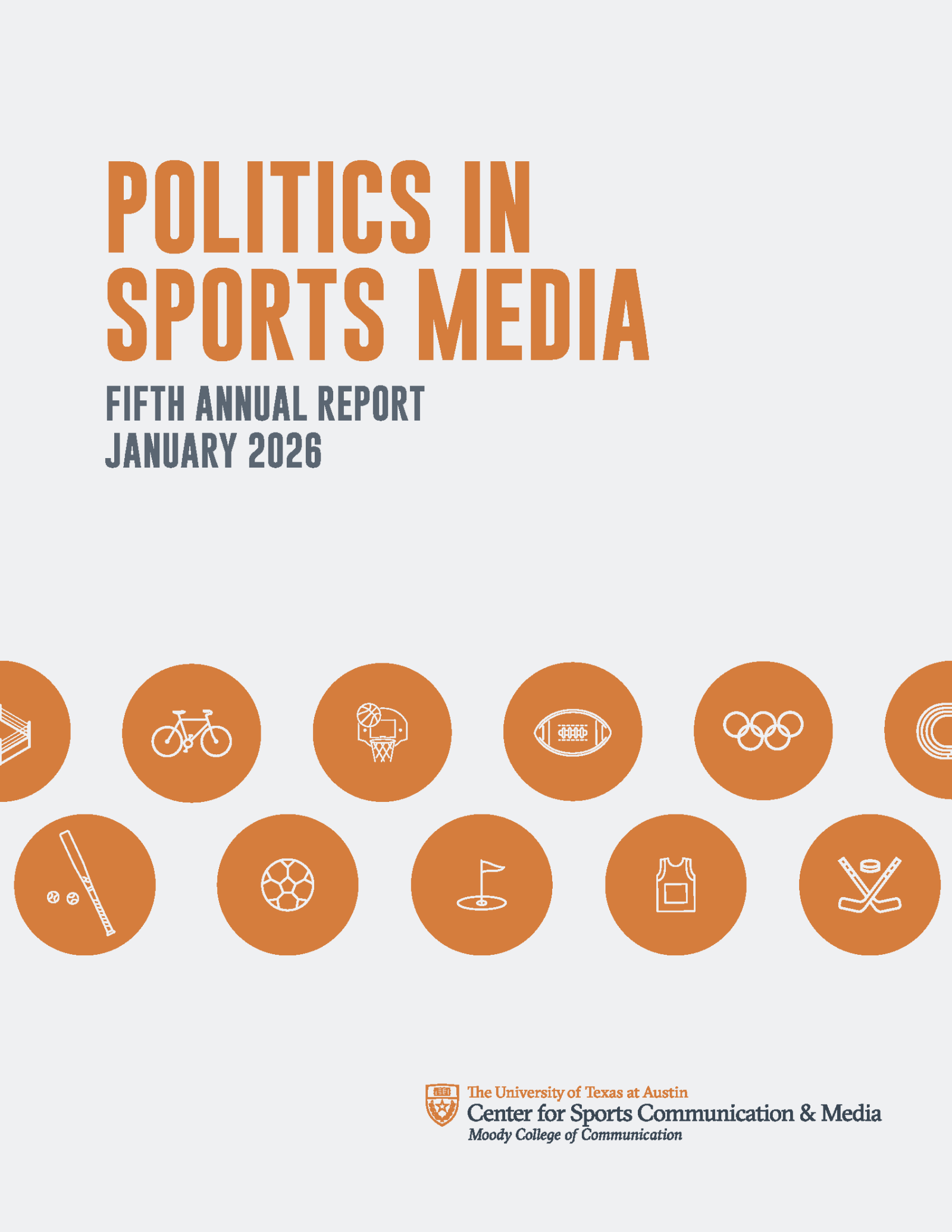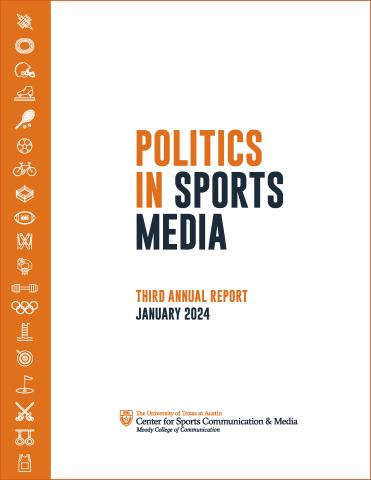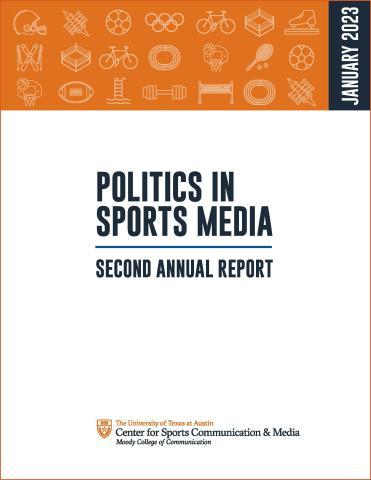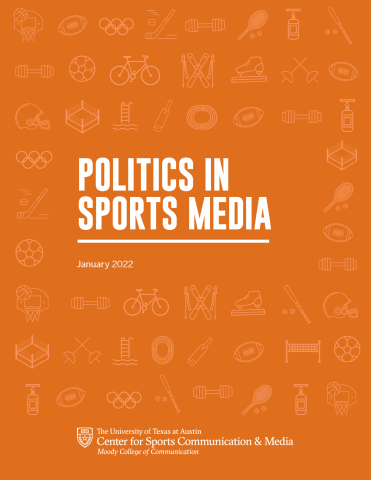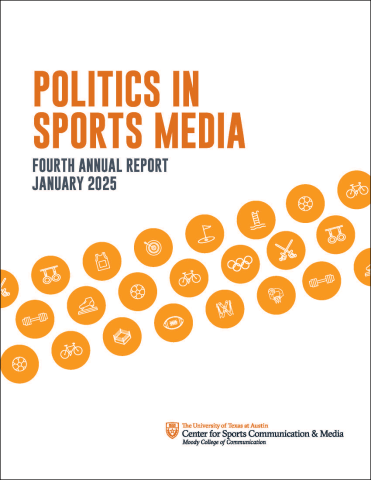
CSCM has released the fourth annual “Politics in Sports Media” report. In a year that included the Summer Olympics and a U.S. presidential election, 2024 demonstrated that the mix of politics and sports is a cultural phenomena which is here to stay. That said, in a marked contrast to our initial report just three years ago, sports media consumers largely do not support athletes, teams, or media mixing politics and sports.
The report’s research team includes 20 contributors, including faculty members, graduate students and undergraduates from the Moody College of Communication and across UT-Austin. The team was led by Dr. Natalie Brown-Devlin and CSCM director Dr. Michael L. Butterworth.
From Dr. Butterworth: "Our fourth annual report reflects on the dominant stories of 2024, including the Summer Olympics, the U.S. presidential election, and coverage of Caitlin Clark, and charts patterns and trends among sports media consumers. Our quantitative, qualitative, and critical assessments help explain the continued interactions between politics and sports and examine the implications of this relationship."
“Politics in Sports Media” defines “politics” broadly to encompass both formal political contexts, such as elections and legislative debates, and the equally important discourse concerning race, gender, sexuality, class, labor, economic development, the environment, and more. As with CSCM's previous reports (2022, 2023, 2024), we are concerned with the ways power and resources are acquired, distributed, and limited in and around sports in the United States. We continue to focus on “mainstream sports media,” meaning that we are attending to electronic and broadcast outlets with the widest reach.
Findings from the fourth annual Politics in Sports Media report include these:
- Among survey participants, the following topics were identified as the “most political”
- sports figure advocacy statements
- current/former athletes running for office
- transgender rights
- coverage of a politician’s fandom
- athlete protest policies
- According to survey results, sports fans overwhelmingly do not support athletes, teams, and sports leagues speaking out on political topics.
- Overall, Republicans rated international sporting events as more political in nature than those who self-identified as Democrats
- In terms of athletes sharing their personal, political beliefs, a vast majority of the sample (75.67%) replied that athletes should not share their political beliefs on sports media platforms. That is a notable increase from the results found in last year’s report in which only a slight majority of participants replied that athletes should not share political beliefs (58.24%).
- With audiences clamoring for sports media organizations to “stick to sports,” actual politicians, themselves, do not simply “stick to politics.” This year, U.S. Presidential Candidate Donald Trump attended many sporting events during the presidential campaign and Democratic Vice President candidate Tim Walz consistently relied on sports metaphors in his stump speeches.
- When asked whether sports leagues should publicly share political statements and beliefs, 91.10% of the survey participants reported that they did not support leagues speaking publicly on "political" issues. In this instance, there was general agreement among Democrats (n = 87.50% against), Independents (n = 90.21% against), and Republicans (91.10% against).
- Participants continued to rank ESPN as the most credible and accurate sports media brand. This year, ESPN was rated as the most trustworthy outlet, as well. Similar to previous years, participants’ evaluations of these sports media outlets differ based on their political party identification. While both Democrats and Independents rated ESPN highest across all three categories, Republican participants rated FOX Sports as the most credible, accurate, and trustworthy brand. Overall participants’ sports media brand evaluations seemed to be partially influenced by participants’ perceptions of their news media counterparts (i.e., FOX Sports/FOX News; NBC Sports/MSNBC).
- Overall, results determined that Yahoo Sports featured political stories on their homepage 93 days out of the overall 100 days examined and ESPN featured political stories on their homepage 94 out of the overall 100 days examined. Therefore, results suggest both Yahoo Sports and ESPN were even in terms of the days they featured political content on their website.
To compile the report, researchers from the Center for Sports Communication & Media surveyed over 500 sports fans about how they define and react to political content in sports and how they perceive leading sports media brands and their mix of sports and political content. The report also includes a content analysis of ESPN and Yahoo websites that reveal which political topics are most frequently featured in mainstream sports media. The report concludes with five case studies evaluating news stories from 2024 that featured politics and sports. Those subjects are:
- Israeli Militainment in Super Bowl Ads
- Harrison Butker and the Politics of Privilege in Sports
- Romania, USA, and the Battle for the Floor Exercise Bronze
- “You've Come a Long Way, Buddy”: Caitlin Clark, Racial Politics, and the WNBA
- Planting the Nation: The Politics of Flags in Sports
Highlights from the 2025 Report
- Politics in Sports Media in 2024
- Survey 1: Audience Perceptions of Political Content in Sports Media (Survey data that show how sports media consumers define and react to political content in sports)
- Survey 2: Audience Perceptions of Sports Media Brands (Survey data that show how sports media consumers perceive leading sports media brands and their mix of sports and political content.)
- Content Analysis of Sports Media Coverage (Content analysis of ESPN.com and Yahoo Sports that reveal which political topics are most frequently featured in mainstream sports media.)
- Critical Case Study Introduction (Case study commentaries that provide critical evaluations of five stories featuring politics and sports.)
- Contributors



